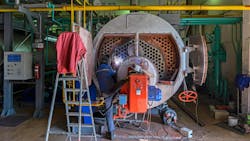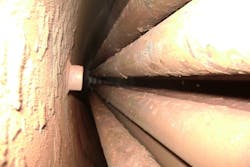Boiler Scale Removal: Don’t Wait for a Ruptured Tube!
Scale, like many things in life, is easy to ignore until it becomes a problem. For boilers that produce hot water and steam for industrial activities, the situation can become serious before the scale is even noticed. Cortec® therefore encourages boiler owners and operators not to wait until a melted boiler tube forces them to face the facts of scale.
Scale Impacts Boiler Performance
Scale forms when certain minerals such as calcium carbonate in the water combine and create scale deposits on boiler internals. The thicker the buildup, the harder it is for water or steam to flow through the pipes. Heat transfer efficiency also drops, demanding more energy to heat the boiler water and create steam. Scott Bryan, CWT, and Technical Sales Manager – Water Treatment at Cortec® Corporation, summarized, “Whenever . . . scale is forming in any system, . . . if you are starving that system of its needed heat transfer efficiency, you are hurting the performance of that whole process.”
Overlooked Scale Leads to Catastrophic Breakdown
Unfortunately, good boiler monitoring information that signals a change in flow or heat transfer efficiency is usually hard to come by, so a plant may experience scale buildup problems long before realizing them. Bryan explained that, if this proceeds too far, it could result in a boiler pipe that ruptures without warning, leading to major problems. He noted, “A boiler will blow a tube and cause the whole system to come down, and that could create a catastrophic event at worst and an unplanned maintenance shutdown at best.” In either case, at least some plant operations will grind to a halt, leading to production losses as well as repair costs.
Best Practice 1: Scale Prevention
To avoid such serious problems, it is important that boiler owners and managers take preemptive steps. The best plan is to minimize the formation of scale deposits by adding an anti-scalant to the normal water treatment program. These chemistries keep dissolved minerals such as calcium carbonate from combining and depositing on the metal. The S-14 Series is a good option that can be added to standard water treatment formulations and easily combined with Cortec’s Vapor phase Corrosion Inhibitor additives.
Best Practice 2: Scale Removal
The second step is to periodically remove scale that has formed. This should be done whenever pressure increases and heating demands rise. However, since these indicators can be difficult to detect in a boiler, it is a good plan to conduct scale removal every few years during routine maintenance. A product such as EcoClean® Biodegradable Scale and Rust Remover powered by Nano-VpCI™ is a great option because it is a USDA Certified Biobased Product that is good at dissolving scale and is much safer than harsher options like muriatic acid.
Don’t Wait for a Ruptured Boiler Tube!
Scale is a normal nuisance in boilers. However, by catching the problem early, boiler owners can avoid the most serious issues that come from scale-induced surprises such as melting or bursting boiler tubes. Contact Cortec® to learn more about adding scale prevention and removal to your routine boiler maintenance program by visiting www.cortecvci.com/contact-us.


